Featured Yale scholars: Jason Abaluck | Jeffrey Alexander | Joseph Altonji | John Bargh | Steven Berry | Scott Bokemper | Dawn Brancati | Judith Chevalier | Nicholas Christakis | Zack Cooper | Molly Crockett | Matthew Denney | Kevin Donovan | Justin Farrell | Eli Fenichel | Ramon Garibaldo | Pinelopi Goldberg | Paul Goldsmith-Pinkham | Jacob Hacker | Gregory Huber | John Eric Humphries | Jutta Joormann | Joshua Kalla | Edward H. Kaplan | Marissa King | Anthony Leiserowitz | Thomas Lyttelton | Andrew Metrick | Ahmed Mushfiq Mobarak | Giuseppe Moscarini | William Nordhaus | Nathan Novemsky | Cormac O’Dea | Rohini Pande | Laurie Santos | Peter Schott | Jasjeet Sekhon | Ian Shapiro | Robert J. Shiller | Kevin Williams | Jennifer Wu | Emma Zang | Fabrizio Zilibotti
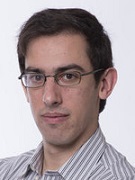 Jason Abaluck
Jason Abaluck
Associate Professor of Economics
Professor Abaluck, with several colleagues around the university, is measuring the benefits of policies designed to combat the spread of COVID-19 such as broader adoption of masks and coupling incentives with testing to construct more representative samples.
Scholarship:
- The Impact of Community Masking on COVID-19: A Cluster-Randomized Trial in Bangladesh (IPA, September 1, 2021)
- Normalizing Community Mask-Wearing: A Cluster Randomized Trial in Bangladesh (NBER, April 2021)
- The case for universal cloth mask adoption and policies to increase the supply of medical masks for health workers (CEPR Press: COVID Economics Vetted and Real-Time Papers Issue 5, April 16, 2020)
- The Case for Universal Cloth Mask Adoption and Policies to Increase Supply of Medical Masks for Health Workers (SSRN, April 6, 2020)
Media:
- No, That New Study Doesn’t Show that Masks Are Useless (Yale Insights, March 8, 2023)
- First randomized trial on masking affirms efficacy, Yale study says (Yale Daily News, September, 13, 2021)
- In a First, Randomized Study Shows That Masks Reduce COVID-19 Infections (Yale Insights, September 1, 2021)
- Massive randomized study is proof that surgical masks limit coronavirus spread, authors say (The Washington Post, September 1, 2021)
- Surgical masks reduce COVID-19 spread, large-scale study shows (Stanford Medicine News Center, September 1, 2021)
- Mask wearing is still essential - and new research shows it can be tripled (Medical X press, May 10, 2021)
- An open letter from scientists across the globe calling for use of fabric masks to prevent COVID-19 (The Hindu, May 14, 2020)
- Faculty Viewpoints: The Public Health Response (Yale Insights, April 17, 2020)
- Time to Put on a Mask (Yale Insights, April 5, 2020)
- Trump Administration Officials Weigh How Far to Go on Recommending Masks (New York Times, April 2, 2020)
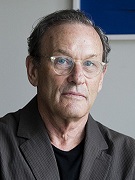 Jeffrey Alexander
Jeffrey Alexander
Lillian Chavenson Saden Professor of Sociology
Jeffrey Alexander works in the areas of theory, culture, and politics. An exponent of the “strong program” in cultural sociology, he has investigated the cultural codes and narratives that inform diverse areas of social life. Working with colleagues and students, Professor Alexander has developed a theory of cultural trauma that describes the process that unfolds after groups — whether national, institutional, religious, or ethnic communities — experience a horrendous event that indelibly changes their collective identity. Recently, he has applied that theory to the COVID-19 pandemic.
Media:
- How to heal the ‘mass trauma’ of Covid-19 (BBC Future, February 3, 2021)
- Yale’s Jeffrey Alexander on how today’s crises might shape tomorrow (YaleNews, June 10, 2020)
- COVID-19 Is Traumatizing All of Us. How Will We Cope After It’s Over? (RollingStone, May 5, 2020)
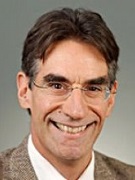 Joseph Altonji
Joseph Altonji
Thomas DeWitt Cuyler Professor of Economics
Professor Altonji specializes in labor economics and applied econometrics. His interests include labor market fluctuations, labor supply, consumption behavior, the economics of education, economic links among family members, race and gender in the labor market, wage determination, and econometric methods. He has worked with a group of Yale economists to report on the drastic effects of the COVID-19 pandemic on U.S. small businesses and the hourly workers they employ.
Scholarship:
- Employment Effects of Unemployment Insurance Generosity During the Pandemic (Yale Tobin Center for Economic Policy, July 14, 2020)
- U.S. Urban Crime Trends During Covid-19 (Yale Tobin Center for Economic Policy, July 5, 2020)
- The Effects of the Coronavirus on Hours of Work in Small Business (Yale Tobin Center for Economic Policy, June 11, 2020)
Media:
- There is no evidence that unemployment benefits in the CARES Act reduced employment: study (The Hill: Changing America, August 6, 2020)
- Unemployment benefits aren’t creating a disincentive for job seekers (Axios, August 4, 2020)
- No evidence $600 kept workers on dole (One Illinois, August 4, 2020)
- New Yale Study: ‘No Evidence’ Expanded UI Discourages Return to Work (Press Release by Speaker of the House Nancy Pelosi, August 3, 2020)
- Federal negotiators say they are far apart on relief package (Newsday, August 2, 2020)
- Pelosi, Mnuchin, Meadows point to disagreements as deal on unemployment benefits, coronavirus relief remains elusive (Washington Post, August 2, 2020)
- New Study Finds Expanded Jobless Benefits Don’t Reduce Employment (National Public Radio, July 31, 2020)
- ‘A meaningful hit to the economy’: What could happen if Congress cuts unemployment benefits (Politico, July 30, 2020)
- Is $600 a Week in Extra Unemployment Aid Deterring People From Seeking Work? (Wall Street Journal, July 29, 2020)
- The $600 unemployment bonuses did not lead to people working less, Yale study shows (Business Insider, July 28, 2020)
- Yale study finds expanded jobless benefits did not reduce employment (YaleNews, July 27, 2020)
- Economists say Congress should think big on the next rescue package (Vox, July 25, 2020)
- Study shows pandemic’s impact on hours worked in U.S. small businesses (YaleNews, June 22, 2020)
 John Bargh
John Bargh
James Rowland Angell Professor of Psychology and Professor of Management
Dr. Bargh directs the ACME lab (Automaticity in Cognition, Motivation, and Emotion) which focuses on unconscious influences in every life – choices, behavior, attitudes, emotions, preferences. Regarding the current pandemic, we are comparing actual mobility using online data bases to self-reported quarantine and social distancing, across all 50 states. One issue in current behavioral science research that relies heavily on surveys and self report questionnaires is whether those self reports are accurate – there is a long history in psychology concerning a person’s actual lack of accurate access to their internal thought processes, intentions, and whether they carry out those intentions or not.
Media:
- To Flatten the COVID-19 Curve, Target the Subconscious (Scientific American, March 30, 2020)
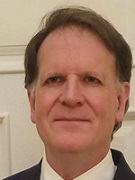 Steven Berry
Steven Berry
David Swensen Professor of Economics and Jeffrey Talpins Faculty Director of the Tobin Center for Economic Policy at Yale
Professor Berry is a Yale economist who has been advising policymakers and legislators during the COVID-19 pandemic. He has partnered with Zack Cooper to advance policy relevant research during this critical time for public health and the U.S. economy.
Scholarship:
- COVID-19: Investment and Federal Leadership to Open the Economy and Prevent a Second (or Third) Wave of the Pandemic (Yale Tobin Center for Economic Policy, April 15, 2020)
Media:
- If You Want to Save the Economy, Stop the Pandemic (Politico, July 10, 2020)
- Yale’s Tobin Center addresses economic challenges of pandemic (YaleNews In Conversation, April 16, 2020)
 Scott Bokemper
Scott Bokemper
Associate Research Scientist, Institution for Social and Policy Studies
Scott Bokemper’s research uses a combination of experimental methods, ranging from economic games to survey experiments. His work is interdisciplinary, spanning fields of political science and disciplines in the social sciences. He has brought this approach to important topics like building support for social insurance and redistribution, understanding preferences over taxation, examining preferences for voting as a collective decision rule, and increasing vaccine acceptance and the practice of preventive behaviors to mitigate the spread of COVID-19.
Scholarship:
- Personal risk or societal benefit? Investing adults’ support for COVID-19 childhood vaccination (Vaccine, June 7, 2023)
- Health Risks and Voting: Emphasizing Safety Measures Taken to Prevent COVID-19 Does Not Increase Willingness to Vote in Person (American Politics Research, April 2, 2023)
- Experimental Evidence that changing beliefs about mask efficacy and social norms increase mask wearing for COVID-19 risk reduction: Results from the United States and Italy (PLOS ONE, October 11, 2021)
- National interest may require distributing COVID-19 vaccines to other countries (Nature Scientific Reports, September 14, 2021)
Media:
- Appeals to community spirit, shame most likely to shift vaccine attitudes (YaleNews, November 3, 2021)
- Widespread masking encourages others to wear masks (YaleNews, October 11, 2021)
 Dawn Brancati
Dawn Brancati
Senior Lecturer in the Department of Political Science
Dawn Brancati studies violence within states, especially around democracy-related issues, as well as potential tools to mitigate it. During the pandemic, Dr. Brancati wanted to play a part in illuminating and navigating this critical moment in history. She focused her efforts on understanding the effects of the pandemic on a very important issue for which there was a lot of discussion in policy circles, but not any social science research at the time.
Scholarship:
- Locking Down Violence: The COVID-19 Pandemic’s Impact on Non-State Actor Violence (American Political Science Review, January 30, 2023)
Media:
- COVID-19 restrictions unexpectedly reduced Islamic State violence - political science experts explain why (The Conversation, February 16, 2023)
- Terror under lockdown: Pandemic restrictions reduce ISIS violence (YaleNews, January 30, 2023)
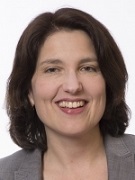 Judith Chevalier
Judith Chevalier
William S Beinecke Professor of Management and Professor of Economics
Professor Chevalier has researched the economic benefits of universal mask-wearing (published in the journal COVID Economics) and is working on a project examining socioeconomic disparities in access to retail and its implications for COVID-19 exposure.
Scholarship:
- Equity Impacts of Dollar Store Vaccine Distribution (medRxiv, April 5, 2021)
- Equity Impacts of Dollar Store Vaccine Distribution (Cowles Foundation Discussion Papers, CFDP 2280, April 2021)
- Nursing Home Staff Networks and COVID-19 (National Bureau of Economic Research, NBER Working Paper No. 27608, July 2020)
- The case for universal cloth mask adoption and policies to increase the supply of medical masks for health workers (CEPR Press: COVID Economics Vetted and Real-Time Papers Issue 5, April 16, 2020)
- The Case for Universal Cloth Mask Adoption and Policies to Increase Supply of Medical Masks for Health Workers (SSRN, April 6, 2020)
Media:
- Will vaccine mandates boost the economy? Economists think so (LSE, September 23, 2021)
- Yale Study: COVID-19 vaccine distribution at dollar stores could improve equity (Yale Daily News, May 7, 2021)
- To Extend Vaccines’ Reach, Distribute Them through Dollar Stores (Yale Insights, April 15, 2021)
- Nursing Home Workers Had One of the Deadliest Jobs of 2020 (Scientific American, February 18, 2021)
- Time to Put on a Mask (Yale Insights, April 5, 2020)
 Nicholas Christakis
Nicholas Christakis
Sterling Professor of Sociology and Professor in the Institute for Social and Policy Studies, of Biomedical Engineering, of Ecology and Evolutionary Biology and of Medicine (General Medicine)
Dr. Christakis’ team is assessing networks in dueling contagions by working on FluSight (app) and African flu surveillance. His team is also evaluating the Chinese mobility restrictions, the American response to isolation, and COVID-19 effect on elections.
Scholarship:
- Apollo’s Arrow: The Profound and Enduring Impact of Coronavirus on the Way We Live (New York: Little, Brown and Company, October 27, 2020)
- Population flow drives spatio-temporal distribution of COVID-19 in China (Nature, April 29, 2020)
- The case for universal cloth mask adoption and policies to increase the supply of medical masks for health workers (CEPR Press: COVID Economics Vetted and Real-Time Papers Issue 5, April 16, 2020)
- The Case for Universal Cloth Mask Adoption and Policies to Increase Supply of Medical Masks for Health Workers (SSRN, April 6, 2020)
Media:
- Nicholas Christakis | Pandemic Impacts and Contagious Behavior (The Jordan Harbinger Show Podcast, June 21, 2021)
- In visions of post-pandemic life, Roaring ’20s beckon again (AP News, May 28, 2021)
- Plague Times: A Conversation with Nicholas Christakis (Ricochet, May 11, 2021)
- Life In The Roaring 2020s: Young People Prepare To Party, Reclaim Lost Pandemic Year (NPR Morning Edition, April 17, 2021)
- What Monkeys Can Teach Humans about Resilience after Disaster (Scientific American, April 8, 2021)
- Nicholas Christakis and Understanding Our Year With COVID-19 (Governing: The Future of States and Localities, March 21. 2021)
- A year of COVID: Making sense of an ‘alien and unnatural’ time (YaleNews, March 4, 2021)
- Post-Pandemic: A Dream of the New Rising Twenties - Entertainment (The Informant, March 1, 2021)
- Consumer sentiment on COVID-19 in 2021: Five actions for brands (WARC, February 19, 2021)
- A “Roaring ’20s Of The 21st-Century” Will Come After The Pandemic, Says Yale Professor (IFL Science, February 11, 2021)
- Opinion: Why the pandemic won’t be over until 2024 (CNN Opinion, February 3, 2021)
- ‘The end of the beginning.’ The dark winter is here and Americans see no end (CNN, February 1, 2021)
- Society in The Time of Plague (GBH News, January 29, 2021)
- The Legacy of COVID-19 (WNPR The Colin McEnroe Show, January 19, 2021)
- Coronavirus In 2021 And Beyond; Adapting Downtowns For Colder Months (WBUR Here & Now, December 23, 2020)
- A Book Talk with Nicholas Christakis - Apollo’s Arrow: The Profound and Enduring Impact of Coronavirus on the Way We Live (Yale Law School recording on Vimeo, November 16, 2020)
- Denial And Lies Are ‘Almost An Intrinsic Part Of An Epidemic,’ Doctor Says (NPR Fresh Air, October 29, 2020)
- A Yale Scientist has written the first great book on how coronavirus is changing our lives - and he says ‘normality’ isn’t coming back until 2024 (Business Insider, October 27, 2020)
- The Long Shadow of the Pandemic: 2024 and Beyond (The Wall Street Journal, October 16, 2020)
- Yale app Hunala aims to be ‘Waze for coronavirus’ (YaleNews, June 5, 2020)
- Why Meatpacking Plants Have Become Covid-19 Hot Spots (Wired, May 7, 2020)
- Yale COVID HASTE Data Science Workshop - Dean’s Discussion with Nicholas Christakis (Youtube, May 4, 2020)
- Researchers Devise New Model to Track COVID-19’s Spread (YaleNews, April 29, 2020)
- Time to Put on a Mask (Yale Insights, April 5, 2020)
- Q&A with Public Health Expert Nicholas Christakis (The Daily Princetonian, April 2, 2020)
- Coronavirus (COVID-19) Update: Social Networks (JAMA Network Learning, April 1, 2020)
- Why scientists think children may be less susceptible to severe coronavirus cases (Yahoo News, March 28, 2020)
- Tracking the pandemic means finding the ‘canaries in the coal mine’ (YaleNews, March 13, 2020)
- Compassion in the time of coronavirus (The Washington Post, March 11, 2020)
- Does closing schools slow the spread of coronavirus? Past outbreaks provide clues (Science, March 10, 2020)
 Zack Cooper
Zack Cooper
Associate Professor of Public Health (Health Policy), Associate Professor of Economics, and Associate Professor in the Institution for Social and Policy Studies
Dr. Cooper’s team is estimating the scale of the revenue contraction health care providers are experiencing as a result of COVID-19 and the appropriate provider reimbursements for COVID-19 testing. Together with Tobin Center faculty co-director Steve Berry, he is also advising state and federal officials on COVID-19 policies from an economic perspective.
Scholarship:
- Economic Principles to Guide the Allocation of COVID-19 Provider Relief Funds (Health Affairs, July 9, 2020)
- COVID-19: Investment and Federal Leadership to Open the Economy and Prevent a Second (or Third) Wave of the Pandemic (Yale Tobin Center for Economic Policy, April 15, 2020)
Media:
- Buoyed by federal COVID aid, big hospital chains buy up competitors. Critics worry consolidation leads to higher prices for medical care. (Hartford Courant, May 21, 2021)
- Buoyed by Federal Covid Aid, Big Hospital Chains Buy Up Competitors (The New York Times, May 21, 2021)
- Many Employers Avoid Coronavirus Tests Over Cost, Not Availability (The New York Times, November 19, 2020)
- The Private Sector Can’t Pay for Everything (The New York Times, October 9, 2020)
- How Companies Are Getting Speedy Coronavirus Tests for Employees (The New York Times, September 15, 2020)
- If You Want to Save the Economy, Stop the Pandemic (Politico, July 10, 2020)
- Economic Principles To Guide The Allocation Of COVID-19 Provider Relief Funds (Health Affairs Blog, July 9, 2020)
- Yale University’s Zack Cooper: Debriefing the Briefing (Apple Podcasts, May 15, 2020)
- We can scale up testing. We’re just waiting on the government to agree. (The Washington Post - Opinions, May 6, 2020)
- How Do You Reopen a Country? (Freakonomics, April 29, 2020)
- A Massive Surge in Testing Is the Only Way to Safely Restore Our Liberty and Economy (Niskanen Center, April 21, 2020)
- Yale’s Tobin Center Addresses Economic Challenges of Pandemic (YaleNews In Conversation, April 16, 2020)
- The Economics of Hospital Beds (NPR Planet Money, April 3, 2020)
 Molly Crockett
Molly Crockett
Assistant Professor of Psychology
Dr. Crockett and her team are studying how social and moral cognition shape people’s responses to social distancing measures and willingness to engage in prosocial behaviors during the COVID-19 crisis. Learn more about the Crockett Lab.
Scholarship:
- Moral dilemmas and trust in leaders during a global health crisis (Nature Human Behaviour, July 1, 2021)
- Using social and behavioural science to support COVID-19 pandemic response (Nature Human Behaviour, April 30, 2020)
- The effectiveness of moral messages on public health behavioral intentions during the COVID-19 pandemic (PsyArXiv Preprints, March 31, 2020)
- COVID-19 Moral Messaging (OSFHome, March 15, 2020)
Media:
- Leaders’ pandemic policies engendered varying levels of trust (YaleNews, July 1, 2021)
- Social Science Researchers Engage Students in Social and Policy Questions Raised by COVID-19 (Yale School of Medicine News, May 14, 2020)
- Emily Falk, Molly Crockett: You can help slow the virus if you talk about it accurately online (Tulsa World, April 29, 2020)
- You can help slow the virus if you talk about it accurately online (The Washington Post, April 28, 2020)
- Tracker helps social scientists coordinate COVID-19 response (Cornell Chronicle, April 16, 2020)
- Pandemics and the Psychology of Uncertainty (World Economic Forum, August 27, 2018)
- How to communicate effectively with the public during COVID-19 (Apolitical, n.d.)
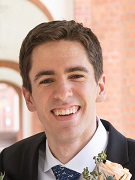 Matthew Denney
Matthew Denney
Ph.D. Candidate in Political Science
Matthew Denney’s research broadly focuses on race and criminal justice in the United States. He employs a range of methods-–ethnography, archival research, quantitative analysis–-to deepen our understanding of the development and lived experience of race and policing, both in history and in cities today. Matt and fellow grad student Ramon Garibaldo Valdez have conducted research on the unequal effects of COVID-19 on Race-Class Subjugated communities, focusing on carceral settings.
Scholarship:
- Compounding Racialized Vulnerability: COVID-19 in Prisons, Jails, and Migrant Detention Centers (Journal of Health Politics, Policy and Law, March 19, 2021)
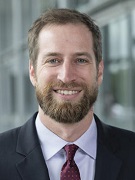 Kevin Donovan
Kevin Donovan
Assistant Professor of Economics, Yale School of Management
In the developing world, many of those most at risk from the economic effects of COVID-19 are beyond the reach of aid programs. Yale SOM’s Kevin Donovan is testing the use of the transfers in a slum on the outskirts of Nairobi.
Media:
- Can Mobile Cash Transfers Help the Very Poor Survive COVID-19? (Yale Insights, May 26, 2020)
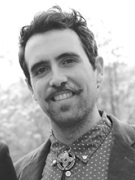 Justin Farrell
Justin Farrell
Associate Professor of Sociology at the Yale School of the Environment
Justin Farrell is a professor and author whose research tackles questions of environment, politics, human culture, conflict, and policy using a mixture of methods, blending ethnographic fieldwork with large-scale computational techniques from network science and machine learning.
Scholarship:
- Impacts of the COVID-19 pandemic on rural America (PNAS, January 5, 2021)
- Impacts of COVID-19 on the rural West: Material needs, economic recovery, and changes in political attitudes (Yale School of the Environment, 2020)
Media:
- Examining the Impact of the COVID-19 Pandemic on the Rural American West (Yale School of the Environment News, January 25, 2021)
- The Pandemic Has Dramatically Changed Rural Attitudes Toward Government (Yale School of the Environment News, August 18, 2020)
 Eli Fenichel
Eli Fenichel
Associate Professor of Forestry and Environmental Studies
Dr. Fenichel’s team is measuring how Americans are responding to COVID-19 and distancing policies. They are using this information to develop behavioral based epidemiological models using a variety of data sources including cell phone tracking and administrative data, analyzing the risks to the United States labor force from COVID-19 and distancing measures, evaluating the unintended consequences of distancing measures, and working on improved testing statistics. Interactive results can be found at Complications mapping and Childcare mapping.
Scholarship:
- Measuring voluntary and policy-induced social distancing behavior during the COVID-19 pandemic (PNAS, April 20, 2021)
- Risk compensation and face mask mandates during the COVID-19 pandemic (Scientific Reports, February 4, 2021)
- Do Face Masks Create a False Sense of Security? A COVID-19 Dilemma (medRxiv, May 27, 2020)
- Measuring voluntary social distancing during the COVID-19 pandemic (medRxiv, May 6, 2020)
- A cell phone data driven time use analysis of the COVID-19 epidemic (medRxiv, April 23, 2020)
- A COVID-19 Risk Assessment for the US Labor Force (ResearchGate, April 13, 2020)
- The Impact of School Closure for COVID-19 on the US Healthcare Workforce and the Net Mortality Effects (SSRN Preprints with The Lancet, March 26, 2020)
- Risk of Complications Conditional on COVID-19 Infection (Yale Mapping COVID Data, n.d.)
- Interactive COVID-19 Childcare Map (Yale Mapping COVID Data, n.d.)
Media:
- Study Finds that Stay-at-Home Orders Strengthened and Accelerated COVID-19 Response that was Already Happening (Yale Institute for Global Health News, April 12, 2021)
- Mask mandates associated with people spending less time at home, Yale School of the Environment study finds (Yale Daily News, February 15, 2021)
- Study finds Americans went out more after face mask mandates (Medical Xpress, February 8, 2021)
- How do masks change human behavior? An Italian scientist who has studied cow sociability decided to find out (The Washington Post, June 5, 2020)
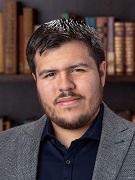 Ramon Garibaldo Valdez
Ramon Garibaldo Valdez
Ph.D. Candidate in Political Science
Ramon Garibaldo Valdez works on issues around social movements, immigration, and racial politics. His research looks at the ways that immigrant communities in the U.S. actively resist – both through political mobilization and every-day defiance – the marginalizing experiences produced by the U.S. immigration policy regime. Ramon is affiliated with the Migrant Justice Initiative and the Latinx Studies Working Group, both housed under the Yale Center for the Study of Race, Indigeneity, and Transnational Migration (RITM). Prior to coming to Yale, Ramon graduated from Johnson C. Smith University, a historically black college in North Carolina. Ramon and fellow grad student Matt Denney have conducted research on the unequal effects of COVID-19 on Race-Class Subjugated communities, focusing on carceral settings.
Scholarship:
- Compounding Racialized Vulnerability: COVID-19 in Prisons, Jails, and Migrant Detention Centers (Journal of Health Politics, Policy and Law, March 19, 2021)
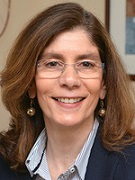 Pinelopi Goldberg
Pinelopi Goldberg
Elihu Professor of Economics
Professor Goldberg, former chief economist at the World Bank Group, is now studying policy responses to the crisis in developing countries and collaborating with colleagues at Yale’s Center for Economic Growth to collect data on COVID-19’s effects on low-income populations.
Media:
- Vaccines for developing countries: the costs and benefits of waiving patents (LSE, May 20, 2021)
- The Problem with the COVID Convergence (Project Syndicate, January 28, 2021)
- Light at the end of a long tunnel (China Daily, January 2, 2021)
- Economist Pinelopi Goldberg switches gears to study the pandemic (YaleNews, May 5, 2020)
- The Economy and World Markets in Turmoil (Jackson Institute Virtual Discussion Forum on COVID-19 and Global Affairs, April 9, 2020)
 Paul Goldsmith-Pinkham
Paul Goldsmith-Pinkham
Assistant Professor of Finance
Professor Goldsmith Pinkham is working on two projects. One aims to provide high-frequency predictions on unemployment insurance claims using Google Trends data at the state and national level to help guide policy. The other, which involves a team of researchers, aims to implement interventions that encourage social distancing and hygiene in India.
Scholarship:
- Excess Death Rates for Republicans and Democrats During the COVID-19 Pandemic (NBER Working Papers, September 2022)
- Predicting Initial Unemployment Insurance Claims Using Google Trends (Working paper, April 3, 2020)
Media:
- Once COVID Vaccines Were Introduced, More Republicans Died Than Democrats (Yale Insights, November 15, 2022)
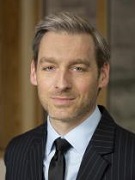 Jacob Hacker
Jacob Hacker
Stanley B. Resor Professor of Political Science
As an author and educator, Jacob Hacker examines how our political system affects the well-being and potential of ordinary Americans. He focuses in particular on economic insecurity and inequality, which he regards as the great economic challenges of our day, especially laid bare during the COVID-19 pandemic.
Media:
- Will COVID-19 Worsen Inequality in the United States? (Yale Insights, August 4, 2020)
 Gregory Huber
Gregory Huber
Forst Family Professor and Department Chair of Political Science, Resident Fellow of the Institution for Social and Policy Studies, Associate Director of the Center for the Study of American Politics, Director of the ISPS Behavioral Research Lab
Dr. Huber’s group is examining social norms and practices about social distancing, safe election practices during a public health outbreak, and how political messages and orientations relate to beliefs about the severity and appropriate response to the COVID-19 outbreak.
Scholarship:
- Personal risk or societal benefit? Investigating adults’ support for COVID-19 childhood vaccination, (Vaccine, June 7, 2023)
- Health Risks and Voting: Emphasizing Safety Measures Taken to Prevent COVID-19 Does Not Increase Willingness to Vote in Person (American Politics Research, April 2, 2023)
- Experimental Evidence that changing beliefs about mask efficacy and social norms increase mask wearing for COVID-19 risk reduction: Results from the United States and Italy (PLOS ONE, October 11, 2021)
- National interest may require distributing COVID-19 vaccines to other countries (Nature Scientific Reports, September 14, 2021)
- Partisan Differences in Social Distancing May Originate in Norms and Beliefs: Results from Novel Data (Social Science Quarterly, March 16, 2021)
Media:
- Yale experts join campaign to boost vaccinations in communities of color (YaleNews, December 17, 2021)
- Emphasizing that vaccines protect others can encourage COVID-19 vaccination, Yale study finds (Yale Daily News, November 10, 2021)
- Appeals to community spirit, shame most likely to shift vaccine attitudes (YaleNews, November 3, 2021)
- Widespread masking encourages others to wear masks (YaleNews, October 11, 2021)
- Yale Professor: Connecticut Voters Would Rather Vote In Person On Election Day Than Vote Absentee (WSHU National Public Radio, November 2, 2020)
- Surge in mail-in voting, health concerns portend a messy Election Day (YaleNews, October 19, 2020)
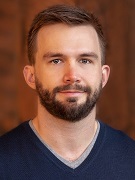 John Eric Humphries
John Eric Humphries
Assistant Professor of Economics
Working with researchers at Princeton and Oxford, Professor Humphries and his team are studying small businesses in the United States and Latin America to understand better how they have been affected by the COVID-19 crisis. They are also assessing the role of information frictions in the utilization of government programs designed to help small businesses.
Scholarship:
- The Evolving Impacts of COVID-19 on Small Businesses Since the Cares Act (Cowles Foundation Discussion Paper No. 2230, April 2020)
Media:
- Survey Shows Pandemic’s Severe Impact on U.S. Small Business (YaleNews, May 1, 2020)
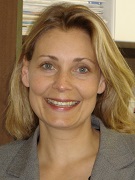 Jutta Joormann
Jutta Joormann
Professor of Psychology
Professor Joormann studies mental health effects of the COVID-19 crisis. In particular, her lab examines how individual differences in emotion regulation and cognition affect depression and anxiety in children, adolescents, and adults throughout the US during COVID-19. Her team evaluates how depression and anxiety symptoms prior to the crisis are related to well-being during the present crisis, and if cognitive factors, especially emotion regulation, contribute to risk and resilience.
Media:
- Mental Health Expectations in a Post(?) Pandemic World: Research and pandemic-related treatment may hold some answers (Psychology Today, January 4, 2023)
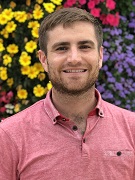 Joshua Kalla
Joshua Kalla
Assistant Professor of Political Science and Statistics and Data Science
Professor Kalla studies political persuasion, prejudice reduction, and decision-making among voters and political elites, primarily through the use of randomized field experiments.
Scholarship:
- Broad Cross-National Public Support for Accelerated COVID-19 Vaccine Trial Designs (Vaccine, January 8, 2021)
Media:
- Yale experts join campaign to boost vaccinations in communities of color (YaleNews, December 17, 2021)
 Edward H. Kaplan
Edward H. Kaplan
William N. and Marie A. Beach Professor of Operations Research at SOM, Professor of Public Health, and Professor of Engineering
Professor Kaplan, an expert on modeling and the spread of infectious disease, has developed what he calls “scratch models” – the mathematical models developed quickly as events unfold – with the goal of providing rigor and context to decision makers as they respond to the COVID-19 pandemic. His models are being used to inform decisions at Yale University, Yale-New Haven Hospital, and the State of Connecticut.
Scholarship:
- OM Forum: COVID-19 Scratch Models to Support Local Decisions (Forthcoming: Manufacturing & Service Operations Management)
- The case for universal cloth mask adoption and policies to increase the supply of medical masks for health workers (CEPR Press: COVID Economics Vetted and Real-Time Papers Issue 5, April 16, 2020)
- The Case for Universal Cloth Mask Adoption and Policies to Increase Supply of Medical Masks for Health Workers (SSRN, April 6, 2020)
Media:
- Health & Veritas: What Does Wastewater Reveal about COVID-19? (Yale Insights, March 24, 2022)
- Study: Controlling COVID-19 Outbreaks in Residential Colleges Requires Frequent Testing (Yale Insights, July 16, 2020)
- The Secret of Connecticut’s Success in Battling COVID-19 (Yale Insights, July 1, 2020)
- Prof. Edward Kaplan Brings Operations Research Tools to Local COVID-19 Decision Making (Yale School of Management News, May 5, 2020)
- Logistics of Agressive Community Screening for Coronavirus 2019 (JAMA Health Forum, May 4, 2020
- New Outbreaks of Coronavirus Can Be Halted with Isolation Measures, According to Study (Yale Insights, February 20, 2020)
 Marissa King
Marissa King
Professor of Management and of Sociology
Professor King’s research examines social networks, social influence, and team dynamics. Her most recent line of work analyzes the role social networks played in the prescription drug abuse epidemic. Her research also provides insights on how the COVID-19 pandemic has impacted social networks, increased loneliness, and affected our connections to other people.
Scholarship:
- Social Networks and Loneliness During the COVID-19 Pandemic (Sage Journals, January 19, 2021)
Media:
- Can You Ask About Someone’s Covid-19 Vaccination Status? (The Wall Street Journal, August 3, 2021)
- How to repair our shrinking social, job networks (Reuters, July 22, 2021)
- Identifying with a Team Helps Prevent Stress and Burnout among Healthcare Workers (Yale Insights, June 22, 2021)
- Video: How Teams Can Lessen Stress and Burnout Among Frontline COVID Workers (YouTube, June 22, 2021)
- Dr. Marissa King on Forming Intentional Relationships (Finding Mastery, June 2, 2021)
- The Upsides and the Downsides of Connecting Digitally (PCMA, May 24, 2021)
- Research: We’re Losing Touch with Our Networks (Harvard Business Review, February 12, 2021)
- Why your “work bestie” matters (Axios, February 3, 2021)
- The Perils of Social Distancing (The New York Times, January 12, 2021)
- Men’s networks have shrunk dramatically because of the pandemic (Reset Work, December 19, 2020)
 Anthony Leiserowitz
Anthony Leiserowitz
Senior Research Scientist and Director of the Yale Program on Climate Change Communication (YPCCC)
Dr. Leiserowitz and his research lab have been conducting social science surveys on the American response to COVID-19. The Yale Program on Climate Change Communication will be releasing additional reports based on these surveys, including analyses of the impacts of the epidemic on public mental health, public acceptance of the CDC recommendation that individuals wear masks, and public responses by state.
Scholarship:
- Mask-wearing increases after a government recommendation: A natural experiment in the U.S. during the COVID-19 pandemic (PsyArXiv Preprints, April 20, 2020)
- American Public Responses to COVID-19 (Yale Program on Climate Change Communication Report Summary, April 2020)
Media:
- Will Politicization of COVID-19 Crisis Erode National Consensus on Response? (Yale School of Forestry & Environmental Science News, April 21, 2020)
 Thomas Lyttelton
Thomas Lyttelton
Ph.D. Candidate in the Yale Department of Sociology
Tom Lyttelton’s dissertation project examines the relationship between workplace contexts, coworker interactions, and labor market outcomes.
Scholarship:
- Parents’ work arrangements and gendered time use during the COVID-19 pandemic (Journal of Marriage and Family, December 9, 2022)
- Telecommuting and gender inequalities in parents’ paid and unpaid work before and during the COVID-19 pandemic (Wiley Online Library: Journal of Marriage and Family, November 10, 2021)
- Gender Differences in Telecommuting and Implications for Inequality at Home and Work (SocArVix, July 9, 2020)
Media:
- Juggling act: New insights into parenting during the pandemic (YaleNews, December 13, 2022)
- The Pandemic Is Taking An Enormous Toll On Working Moms - But Here’s How Employers Can Help With Gender Equity (Forbes, July 29, 2020)
- Study reveals gender inequality in telecommuting (YaleNews, July 17, 2020)
 Andrew Metrick
Andrew Metrick
Janet L. Yellen Professor of Finance and Management
In an online event hosted by the Bank for International Settlement, Professor Metrick, director of the Yale Program on Financial Stability, discussed actions that governments have already taken to prevent the COVID-19 pandemic from sparking a full-blown financial crisis, and the challenges still to come.
Media:
- Faculty Viewpoints: The Economic Policy Response (Yale Insights, May 12, 2020)
- Faculty Viewpoints: Preventing a Financial Crisis (Yale Insights, May 4, 2020)
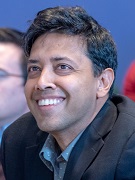 Ahmed Mushfiq Mobarak
Ahmed Mushfiq Mobarak
Professor of Management and of Economics
Professor Mobarak and the team at Y-RISE are conducting high-frequency phone-based surveys and experimental evaluations to support the government of Bangladesh develop an evidence-based policy response to contain the COVID-19 crisis. They are combining the data with modeling to provide guidance on appropriate policy responses in low and middle-income countries.
Scholarship:
- The Impact of Community Masking on COVID-19: A Cluster-Randomized Trial in Bangladesh (IPA, September 1, 2021)
- COVID-19 vaccine acceptance and hesitancy in low- and middle-income countries (Nature Medicine, July 16, 2021)
- Normalizing Community Mask-Wearing: A Cluster Randomized Trial in Bangladesh (NBER, April 2021)
- Falling living standards during the COVID-19 crisis: Quantitative evidence from nine developing countries (AAAS Science Advances, February 5, 2021)
- Prevalence of COVID-19 symtoms, risk factors, and health behaviors in host and refugee communities in Cox’s Bazar: a representative panel study (In preprint at the Bulletin of the World Health Organization, May 11, 2020)
- Should Low-Income Countries Impose the Same Social Distancing Guidelines as Europe and North America to Halt the Spread of COVID-19? (Y-RISE Policy Brief, April 2, 2020)
Media:
- Prof. Mushfiq Mobarak Speaks at WHO’s World Health Assembly (Yale School of Management, June 2, 2022)
- Expert: Supplying masks at low prices positively changed people’s behavior (Dhaka Tribune, May 30, 2022)
- Yale SOM Hosts Conference on Global Vaccine Inequity (Yale School of Management, May 12, 2022)
- Bangladeshi economist from Yale: Dr. Mushfiq’s masterclass arranged by YPF (The Business Standard, April 3, 2022)
- Prof. Mushfiq Mobarak Leads Call for Innovation in Tackling COVID-19 in Low- and Middle-Income Countries (Yale School of Management News, March 11, 2022)
- First randomized trial on masking affirms efficacy, Yale study says (Yale Daily News, September, 13, 2021)
- In a First, Randomized Study Shows That Masks Reduce COVID-19 Infections (Yale Insights, September 1, 2021)
- Massive randomized study is proof that surgical masks limit coronavirus spread, authors say (The Washington Post, September 1, 2021)
- Surgical masks reduce COVID-19 spread, large-scale study shows (Stanford Medicine News Center, September 1, 2021)
- Send Vaccines Where People Want Them: Developing Nations (Yale Insights, July 20, 2021)
- Mask wearing is still essential - and new research shows it can be tripled (Medical X press, May 10, 2021)
- Voter Suppression Bills; Covid-19; And, Deb Haaland (WNPR, The Colin McEnroe Show, February 28, 2021)
- The Pandemic Has Caused a Steep Decline in Living Standards (Scientific American, February 5, 2021)
- Pandemic erodes living standards in developing countries, study shows (YaleNews, February 5, 2021)
- COVID-19 is pushing migrants back to their home countries (openDemocracy, January 21, 2021)
- What the US can learn from how African countries handled Covid (CNN World, November 3, 2020)
- This Country Fought Ebola. It May Beat Another Disease: How to combat COVID-19 in a developing economy (The New York Times, June 16, 2020)
- Yale survey of refugees in Bangladesh aims to help prevent COVID-19 spread (YaleNews, May 26, 2020)
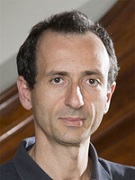 Giuseppe Moscarini
Giuseppe Moscarini
Professor of Economics
Giuseppe Moscarini is an economist and labor market expert who has proposed policy measures to address the economic fallout from the COVID-19 pandemic. Drawing on his research during the 2008-2009 global financial crisis, Professor Moscarini offers recommendations for keeping workers and businesses afloat, productive, and attached to each other.
Media:
- Yale economists react to increased inflation (Yale Daily News, November 10, 2021)
- Backwards Economics: When Unemployment Offers a Living Wage (NBC Connecticut, August 10, 2020)
- Managing roiling labor markets amid COVID-19 (YaleNews In Conversation, April 2, 2020)
- The labour market policy response to COVID-19 must save aggregate matching capital (VOX CEPR Policy Portal, March 30, 2020)
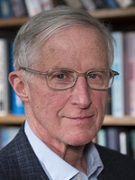 William Nordhaus
William Nordhaus
Sterling Professor of Economics and Professor of Forestry and Environmental Studies
A team of social scientists led by Nobel Prize-winning Yale economist William Nordhaus has pioneered a new approach to appraising the state of the U.S. labor market in real time. The Yale Labor Survey (YLS), a rapid-fire survey tool that collects weekly data on the labor market experience of U.S. households, has been used to estimate and track the U.S. unemployment rate during the COVID-19 pandemic.
Scholarship:
- Work in the Time of COVID: Results from the Yale Labor Survey (Yale Tobin Center for Economic Policy, June 23, 2020)
Media:
- Yale Labor Survey tracks U.S. labor markets in real time (YaleNews, June 25, 2020)
 Nathan Novemsky
Nathan Novemsky
Professor of Marketing at SOM and of Psychology
Professor Novemsky is an expert in the psychology of judgment and decision-making, an area that overlaps heavily with behavioral economics and consumer behavior. He has published articles in leading marketing and psychology journals on topics that include: how people made judgments and decisions based on the information in front of them, how they know what they like, how the way they frame decisions affects the choices they make, how they choose and evaluate gifts, how their goals influence their behavior and other topics in judgment and decision-making. In recent articles, he has applied this knowledge to how consumers behave during and after a pandemic, and the psychology of getting vaccinated for COVID-19.
Media:
- The psychology behind COVID-19 vaccine lotteries (Axios, June 21, 2021)
- A coronavirus vaccine is coming yet many say they won’t get it although they want COVID to end. What gives? (Fox Business, November 20, 2020)
- Understanding and shaping consumer behavior in the next normal (McKinsey & Company, July 2020)
- Good Marketing in Touch Times: A Coronavirus Compilation (HBlog, March 25, 2020)
- Why a Pandemic Leads to Panic Buying (Yale Insights, March 16, 2020)
 Cormac O’Dea
Cormac O’Dea
Assistant Professor of Economics
Cormac O’Dea’s research interests include labor economics and public economics. During the COVID-19 pandemic, he has been working with new sources of data like Homebase to study employment patterns in the U.S. and explore how firms and workers respond to policy changes in real time.
Scholarship:
- Employment Effects of Unemployment Insurance Generosity During the Pandemic (Yale Tobin Center for Economic Policy, July 14, 2020)
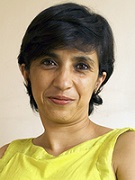 Rohini Pande
Rohini Pande
Henry J. Heinz II Professor of Economics and Director, Economic Growth Center
Professor Pande and Charity Troyer Moore (at Yale’s Macmillan Center) are working to collect and analyze information on how the COVID-related lockdown in India and Nepal is affecting those countries’ very poorest citizens, and in particular poor women. Through this work they aim to help ensure that policy-makers responsible for mitigating the effects of lockdown can effectively target those most in need.
Scholarship:
- A Majority of India’s Poor Women May Miss COVID-19 PMJDY Cash Transfers (Economic Growth Center Policy Brief, April 7, 2020)
Media:
- India’s digital-centric vaccination strategy excludes the most vulnerable (Yale Economic Growth Center, July 2021)
- How Yale economists are informing India’s COVID-19 response (YaleNews, December 22, 2020)
- Death of an Infant Shows Cruelty of Starving in a Country of Food Abundance (Bloomberg, October 19, 2020)
- Preparing for Nepal’s upcoming flood season and Covid-19: Covid-19 and Nepal’s Health Financing (Yale Economic Growth Center, July 24, 2020)
- Measuring the effects of lockdowns in India and Nepal (YaleNews, May 4, 2020)
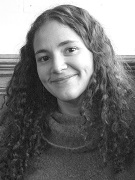 Laurie Santos
Laurie Santos
Professor of Psychology
Dr. Santos is using her podcast (The Happiness Lab, Pushkin Industries) to share best practices to protect one’s mental health during this crisis. She plans to deliver 1-2 episodes of the podcast per week during the pandemic with the goal of communicating evidence-based tips that her listeners can use to improve their mental health and reduce anxiety during this challenging time.
Media:
- Two years into the pandemic, Yale’s ‘happiness’ course is more popular than ever (CNN, January 23, 2022)
- Laurie Santos: Can we learn how to be happy? (BBC HARDtalk, February 10, 2021)
- How to Beat Loneliness In the Time of Social Distancing (Shape, October 22, 2020)
- Yale livestream focuses on key to school reopening: students’ mental health (YaleNews, August 20, 2020)
- Smile! Could the pandemic lead to happier times? (The Guardian, June 21, 2020)
- Yale professor promotes other-care over self-care to get happy (Yahoo!life, May 20, 2020)
- A professor of happiness explains how to deal with COVID-19 (World Economic Forum, April 21, 2020)
- Anxiety is high because of coronavirus. Here’s how you can feel better. (The Washington Post - Health, April 20, 2020)
- Coronavirus: A survival guide (AAAS Science Webinar, April 16, 2020)
- Happiness in the time of COVID-19: Santos’s “The Science of Well-being” gains over a million new subscribers (Yale Daily News, April 6, 2020)
- A housebound world finds solace in Yale’s ‘Science of Well Being’ course (YaleNews, March 25, 2020)
- Yale Prof. Discusses Loneliness in the Time of COVID-19 (PBS Amanpour & Co. , March 17, 2020)
 Peter Schott
Peter Schott
Juan Trippe Professor of International Economics
Professor Schott and his team are using unexpected changes in the trajectory of COVID-19 infections to quantify its impact on aggregate and firm-level stock returns. They are also investigating whether these relationships are useful in predicting employment losses and other outcomes.
Scholarship:
- Aggregate and Firm-Level Stock ReturnsDuring Pandemics, in Real Time (Working Paper, April 11, 2020)
Media:
- Why Did the Stock Market Bounce Back While COVID-19 Cases Kept Rising? (Yale Insights, June 10, 2020)
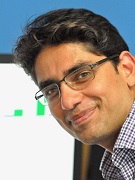 Jasjeet Sekhon
Jasjeet Sekhon
Professor of Statistics & Data Science and Professor of Political Science
Professor Sekhon has conducted research on causal inference, machine learning, experimental design, and has worked on applications across the social sciences, including political science, economics, and epidemiology. His current research focuses on developing interpretable and credible machine learning methods for estimating causal relationships.
Scholarship:
- Broad Cross-National Public Support for Accelerated COVID-19 Vaccine Trial Designs. (Vaccine, January 8, 2021).
 Ian Shapiro
Ian Shapiro
Sterling Professor of Political Science
Ian Shapiro has written widely and influentially on democracy, justice, and the methods of social inquiry. He has coauthored a new book, The Wolf at the Door: The Menace of Economic Insecurity and How to Fight It, with Michael Graetz, a professor at Columbia Law School and professor emeritus at Yale University. They have highlighted deficiencies in U.S. social insurance as it relates to job loss, an issue which has become even more urgent during the COVID-19 pandemic.
Media:
- Unemployment insurance is broken: How to fix it (New York Daily News, August 11, 2020)
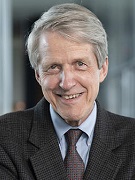 Robert J. Shiller
Robert J. Shiller
Sterling Professor of Economics, Department of Economics and Cowles Foundation for Research in Economics, and Professor of Finance and Fellow at the International Center for Finance, SOM
Nobel Prize-winning Yale economist Robert Shiller has written on financial markets, financial innovation, behavioral economics, macroeconomics, real estate, statistical methods, and on public attitudes, opinions, and more judgments regarding markets. He is frequently asked to share his insights on matters regarding the COVID-19 pandemic and its effect on the U.S. and global economies.
Media:
- What have they been thinking? Homebuyer behavior in hot and cold markets: A ten-year retrospective (Brookings, March 23, 2022)
- People Fear a Market Crash More Than They Have in Years (The New York Times, October 23, 2020)
- Home prices could fall in major cities as Americans sour on urban living, says Nobel Prize-winning economist Robert Shiller (MarketWatch, July 15, 2020)
- Why We Can’t Foresee the Pandemic’s Long-Term Effects (The New York Times, May 29, 2020)
- Covid-19: Shocks & Crisis Ahead (lexpress.mu, May 26, 2020)
- Is the Stock Market’s Response to COVID-19 Optimistic or Just Plain Nuts? (Reason.com, May 18, 2020)
- Does Covid-19 Prove the Stock Market is Inefficient? (A Wealth of Common Sense, May 11, 2020)
- How Will We Tell the Story of COVID-19? (Yale Insights, April 28, 2020)
- Robert Shiller: Why Investors Are Comparing COVID-19 to the Great Depression (ThinkAdvisor, April 24, 2020)
- COVID-19: What you need to know about the coronavirus pandemic on 4 April (World Economic Forum, April 4, 2020)
- Now the world faces two pandemics - one medical, one financial (The Guardian, April 1, 2020)
- The Two Pandemics by Robert J. Shiller (Project Syndicate, March 31, 2020)
- Your Money: Coronavirus fears shake Yale economist Robert Shiller (Reuters, March 19, 2020)
- Yale’s Shiller on Economic Fallout From Virus, Fed Policy and Housing (Video on Bloomberg.com, March 9, 2020)
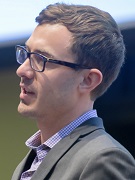 Kevin Williams
Kevin Williams
Associate Professor of Economics
Dr. Williams and a team of economists are using smartphone movement data to create human exposure indices for COVID-19 modeling. They are studying movements within and across counties, as well as measuring exposure at the establishment level.
Scholarship:
- Equity Impacts of Dollar Store Vaccine Distribution (medRxiv, April 5, 2021)
- Equity Impacts of Dollar Store Vaccine Distribution (Cowles Foundation Discussion Papers, CFDP 2280, April 2021)
- How Is the Airlines Industry Adapting to COVID? (Yale Insights, October 8, 2020)
- Open Smartphone Data (GitHub, n.d.)
Media:
- Yale study: COVID-19 vaccine distribution at dollar stores could improve equity (Yale Daily News, May 7, 2021)
- To Extend Vaccines’ Reach, Distribute Them through Dollar Stores (Yale Insights, April 15, 2021)
- Air Travel Is Already Back to Normal in Some Places. Here’s Where. (The New York Times: The Upshot, April 1, 2021)
- What Can Smartphone Location Data Tell Us about the Pandemic? (Yale Insights, November 2, 2020)
 Jennifer Wu
Jennifer Wu
Ph.D. Candidate in Political Science
Jennifer Wu is a PhD candidate in the Department of Political Science. Her research interests focus on voters come to form preferences over and demand for representation, particularly within minority groups, and how elites update mobilization efforts in response. Additionally, she is interested understanding policy attitudes and behaviors, specifically in the context of recipient deservingness and program support.
Scholarship:
- Partisan Differences in Social Distancing May Originate in Norms and Beliefs: Results from Novel Data (Social Science Quarterly, March 16, 2021)
 Emma Zang
Emma Zang
Assistant Professor of Sociology
Emma Zang is a demographer and quantitative methodologist whose research interests lie at the intersection of health and aging, marriage and family, and inequality.
Scholarship:
- Parents’ work arrangements and gendered time use during the COVID-19 pandemic (Journal of Marriage and Family, December 9, 2022)
- U.S. regional differences in physical distancing: Evaluating racial and socioeconomic divides during the COVID-19 pandemic (PLOS ONE, November 30, 2021)
- Telecommuting and gender inequalities in parents’ paid and unpaid work before and during the COVID-19 pandemic (Wiley Online Library: Journal of Marriage and Family, November 10, 2021)
- Gender Differences in Telecommuting and Implications for Inequality at Home and Work (SocArVix, July 9, 2020)
Media:
- Yale Study Shows More Parenting During the Pandemic (NBC Connecticut, January 5, 2023)
- Juggling act: New insights into parenting during the pandemic (YaleNews, December 13, 2022)
- Physical distancing to slow COVID-19 lagged in South, rural areas (YaleNews, November 30, 2021)
- The Pandemic Is Taking An Enormous Toll On Working Moms - But Here’s How Employers Can Help With Gender Equity (Forbes, July 29, 2020)
- Study reveals gender inequality in telecommuting (YaleNews, July 17, 2020)
 Fabrizio Zilibotti
Fabrizio Zilibotti
Tuntex Professor of International and Development Economics
Professor Zilibotti is studying the effectiveness of different policies to combat COVID-19 across European countries and regions. He is also working on the effect of the crisis for children’s education. In particular, he focuses on the unequal effect of school closures on children from different socio-economic background both in the US and from a comparative perspective. In cooperation with a team of Chinese researchers, he is engaged in data collection for a study aimed to evaluate the nature and effect of lockdown policy in China.
Scholarship:
- When the Great Equalizer Shuts Down: Schools, Peers, and Parents in Pandemic Times (NBER Working Paper 28264, December 2020)
Media:
- Yale economists react to increased inflation (Yale Daily News, November 10, 2021)
- For some kids, a year of slippage (Yale Alumni Magazine, May/June 2021)
- Roemer: Keeping schools closed has cost students dearly; more funds critical, but may not solve problem | COMMENTARY (Carroll County Times Opinion, February 19, 2021)
- COVID school closures most harm students from poorest neighborhoods (YaleNews, January 5, 2021)
- V-Shaped Recovery or Hysteresis? (Finanz und Wirtschaft, May 25, 2020)
- In Progress: A Tool to Help Policymakers Safely Re-open the Economy (YaleNews, May 20, 2020)
- COVID-19 and Children’s Education (Psychology Today, April 1, 2020)
